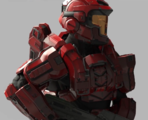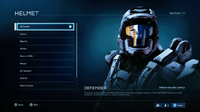DEFENDER-class Mjolnir
From Halopedia, the Halo wiki
Template:Armor Infobox Template:Article Quote The MJOLNIR Powered Assault Armor/Defender is a variant of the MJOLNIR Powered Assault Armor [GEN2] utilized by SPARTAN-IVs.[1] The observation and communication features of the Defender helmet are well-suited for combat actuation in urban environments. The placid Defender faceplate is a symbol of both UNSC oppression and protection, due to use by Spartan anti-Insurrectionist units.[2]
Development history
The MJOLNIR/Defender variant was manufactured by Imbrium Machine Complex and is employed at research facilities on Trevelyan and Installation 03.[1] It was tested at Ankara, Mare Imbrium on Luna.[1] It was developed in response to the Ordnance Commission which stated the need for defense-centric armor variants, which would be used for the protection of civilian populations rather than the assault of enemy strongholds. The Defender variant is generally used on controller bases, ONI sites, and colonial populations where civil unrest is common.[3]
In-game information

|
Browse more images in this article's gallery page. |
Halo 4
Unlock: Achieve Spartan Rank 24
- Description: Currently emplyed at research facilities on Trevelyan and Gamma Halo.
Available skins: CTRL(Control) and CLMN(Column)
- The CTRL skin is obtainable by completing the Bullet in the Brain commendation.
- The CLMN skin is obtainable by purchasing the Champions Bundle. This is not usable in Spartan Ops.
Halo 5: Guardians
Unlock: Rare REQ card
- Helmet Description: It has not escaped notice that the observation and communication features of the DEFENDER helmet are well-suited for combat actuation in urban environments.
- Body Description: The placid DEFENDER faceplate is a symbol of both UNSC oppression and protection, due to use by Spartan anti-Insurrectionist units.
Available skins: Castle, Fortress, and Redoubt
Castle Unlock: Rare REQ card
Fortress Unlock: Rare REQ card
Redoubt Unlock: Rare REQ card
Gallery
Front and back views of the Defender armor in Halo 4.
The Defender armor in Halo 5: Guardians.
The Defender helmet in the Halo 5: Guardians Multiplayer Beta.
List of appearances
- Halo 4 (First appearance)
- Halo 5: Guardians
- Halo Online
Sources
- ^ a b c Halo 4, MJOLNIR/Defender armor description
- ^ Halo 5: Guardians Multiplayer Beta
- ^ Halo 4: The Essential Visual Guide, page 150








